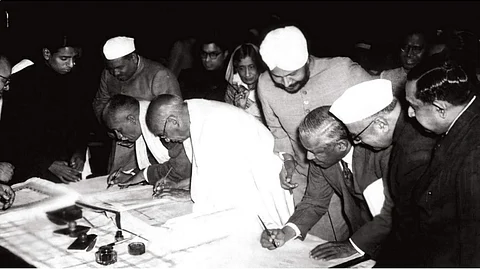

By definition, a constitution is said to be "an aggregate of fundamental principles or established precedents that constitute the legal basis of a polity, organisation or other type of entity, and commonly determine how that entity is to be governed." As far as the Indian Constitution is considered, it is unique in its content and spirit, however, it has parts and features that have been borrowed from the constitutions of other countries around the world.
There is nothing wrong in that, as Dr BR Ambedkar, who was the Chairman of the Drafting Committee, had said, "There is nothing to be ashamed of in borrowing. It involves no plagiarism. Nobody holds any patent rights in the fundamental ideas of a Constitution." The constituent assembly assessed various constitutions and drafted one taking all the provisions that best applied to India’s diversity. So, what did our ancestors get inspiration from exactly? We bring to you a list of the features we borrowed and the countries we borrowed them from.
Name of countries and what we borrowed from them:
Britain
1. Parliamentary government
2. Rule of Law
3. Legislative procedure
4. Single citizenship
5. Cabinet system
6. Prerogative writs
7. Parliamentary privileges
8. Bicameralism
Ireland
1. Directive Principles of State Policy
2. Method of Election of the president
3. Members nomination to the Rajya Sabha by the President
Unites States of America
1. Impeachment of the president
2. Functions of president and vice-president
3. Removal of Supreme Court and High court judges
4. Fundamental Rights
5. Judicial review
6. Independence of judiciary
7. Preamble of the constitution
Canada
1. Centrifugal form of federalism where the centre is stronger than the states.
2. Residuary powers vest with the centre
3. Centre appoints the Governors at the states
4. Advisory jurisdiction of the supreme court
Australia
1. Concept of Concurrent list
2. Article 108 i.e. Joint sitting of the two houses
3. Freedom of trade and commerce
Russia
1. Fundamental duties
2. The ideals of justice (social, economic and political), expressed in the Preamble.
France
1. Concept of 'Republic'
2. Ideals of Liberty, Equality and Fraternity(contained in the Preamble)
Germany
1. Fundamental Rights are suspended during Emergency
South Africa
1. Election of members of the Rajya Sabha
2. Amendment of the Constitution
Japan
1. Concept of 'procedure established by Law'
(With inputs from Wikipedia)
